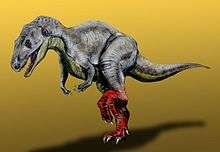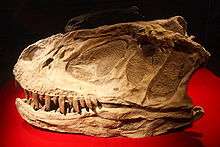Sinraptor
| Sinraptor Temporal range: Late Jurassic, 160 Ma | |
|---|---|
 | |
| S. dongi, Royal Tyrrell Museum | |
| Scientific classification | |
| Kingdom: | Animalia |
| Phylum: | Chordata |
| Clade: | Dinosauria |
| Order: | Saurischia |
| Suborder: | Theropoda |
| Family: | †Metriacanthosauridae |
| Subfamily: | †Metriacanthosaurinae |
| Genus: | †Sinraptor |
| Type species | |
| †Sinraptor dongi Currie and Zhao, 1994 | |
| Species | |
| |
Sinraptor is a genus of theropod dinosaur from the Late Jurassic. The name Sinraptor comes from the Latin prefix "Sino", meaning Chinese, and "Raptor" meaning thief.[1] The specific name dongi honours Dong Zhiming. Despite its name, Sinraptor is not related to dromaeosaurids (often nicknamed "raptors") like Velociraptor.
Discovery


The holotype specimen of Sinraptor was uncovered from the Shishugou Formation during a joint Chinese/Canadian expedition to the northwestern Chinese desert in 1987, and described by Philip J. Currie and Zhao Xijin in 1994.[2] Standing nearly 3 meters (9.8 feet) tall and measuring roughly 7.6 meters (25 feet) in length, two species of Sinraptor have been named. S. dongi, the type species, was described by Currie and Zhao in 1994. A second species, originally named Yangchuanosaurus hepingensis by Gao in 1992,[3] may actually represent a second species of Sinraptor. Whether or not this is the case, Sinraptor and Yangchuanosaurus were close relatives, and are classified together in the family Metriacanthosauridae.[4]
The skeleton of Sinraptor hepingensis (formerly referred to Yangchuanosaurus) is on display at the Zigong Dinosaur Museum, Zigong, China.
Pathology
Sinraptor dongi skull specimen IVPP 10600 exhibits "a variety of gently curving tooth drags or gouges, shallow, circular punctures and one fully penetrating lesion." One rib was broken and healed via telescoping of its capitular shaft.[5]
References
- ↑ Marshall, Chris (1999). Dinosaurs of the World. Marshall Cavendish Corporation. p. 551. ISBN 0761470816.
- ↑ P. J. Currie and X.-J. Zhao. 1994. A new carnosaur (Dinosauria, Theropoda) from the Jurassic of Xinjiang, People's Republic of China. Canadian Journal of Earth Sciences 30(10-11):2037-2081
- ↑ Y. Gao. 1992. Yangchuanosaurus hepingensis – a new species of carnosaur from Zigong, Sichuan. Vertebrata PalAsiatica 30(4):313-324
- ↑ Carrano, M.T.; Benson, R.B.J.; Sampson, S.D. (2012). "The phylogeny of Tetanurae (Dinosauria: Theropoda)". Journal of Systematic Palaeontology 10(2):211. doi:10.1080/14772019.2011.630927
- ↑ Molnar, R. E., 2001, Theropod paleopathology: a literature survey: In: Mesozoic Vertebrate Life, edited by Tanke, D. H., and Carpenter, K., Indiana University Press, p. 337-363.
